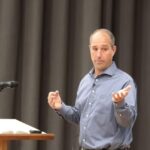I would invite you as we think about “Teachers are Mentors” to turn in your songbooks to number 585. We have a very common song. The words of this song, I think, are very meaningful in this talk. It’s the song “Follow the Path of Jesus.” And if you think about it, this is what Jesus did with his twelve disciples. He simply invited them to walk with him for three years, and then he said, “Now go and preach. Baptize and teach in all places.” That is what we are called to do as teachers is to impact lives as Jesus did.
What is a mentor? I think mentoring is taking your life experience and giving it away for free. What cost you blood, sweat, and tears, agony, sleepless nights, and lots of years of experience, and you just offer that to a younger person for free.
Sometimes you see positive outcomes for your investment and sacrifice, and sometimes you don’t. I think mentoring in a Christian school setting is more like this. It’s a miracle in which a special relation, a relational bond, is formed between two people, one with more experience than the other. Because of this special bond comprised of deep trust, admiration and relationship, God molds and changes their lives forever. I would suggest that he changes and molds both of their lives in a better way.
Sometimes this relationship is intentional, and sometimes it isn’t intentional. It just happens. Here’s the scary part. Sometimes the mentor isn’t even aware of the relationship. Now don’t let that paralyze you this morning. I would say to you, cling to the hand of Jesus. Follow him day and night, and you’ll do alright.
I suggest to you that there are three A’s of mentoring, if this is helpful. It’s gonna take active listening, and you listen and listen and listen. And I think you are earning the right, then to say a few sentences at the end.
It means availability. Availability is a big thing, and it’s not gonna suit your schedule. It’s it’s not gonna happen when it really works well for you.
You’re going to need to analyze their issue. I often send a quiet prayer up to God and say, “I have no idea what to say. Give me words. Give me words for this person because they they’re seeking direction. They wanna know what I think. I wanna know what you think.” And you’re going to need to be kind, and you’re going to need to be truthful.
Think about mentors and what mentors do. Mentors give second chances. Mentors allow for mistakes. Good mentors actually expect mistakes. I like to see mentors who are so close to the situation that when the young man drops the ball, they actually catch it before it hits the floor. They don’t let the thing go splat. But you can’t always do that. But good mentors are going to realize that they’re gonna be let down.
I would suggest that mentors take risks on inexperience. They, in fact, risk their own reputation sometimes. They risk mature relationships for the sake of the inexperienced and that relationship.
It doesn’t always go smoothly. Mentees. I’m not really familiar or comfortable with that term, but the person being mentored sometimes fails. And even more sadly, the mentor fails sometimes. I have failed as a mentor. I have let people down that were depending on me. Both ways. So many times I forget how many chances it took for me, how many risks others took on me, how many chances they took.
You know, sometimes you teach and you interact, and these people move out of your lives. And and here is a little push encouragement for that experienced teacher that you had a relationship with this person, but now they’re grown up and maybe they have a big truck and, you know, a gun rack in the back and stuff like that, and they seem really tough. Don’t hesitate to seek them out and talk to them, because you still mean more to them than you will ever know. And you still, with a few words, can light their path and direct their way. Even if they’re going a wrong way, reach out to them.
Baidon was about thirteen or fourteen when he came to grade five at our school. And since our school only went to grade six, he was there for two years, and I would see him at school. And he started coming to our church, and he was there for Sunday school. And often on Sundays, he would just stay at our house for lunch, and he’d be there in the afternoon and sometimes go to church with us in the evening, and that that was pretty much the extent of our relationship. He became a Christian at our church and joined instruction class. And as the pastor, I took him through instruction class.
And then one day he came to instruction class, and he was really troubled. And he wanted to talk to me. And he said, “I have a problem. You see, my mom became a Christian.”
She was a single mom, and she was raising her two youngest boys, Baidon and his younger brother. Their dad who walked out on their family years before, and his mom had become a Christian at one of the other evangelical churches in town.
And he said, “My problem is that my mom wants me to go to church with her. I don’t know if I did the right thing.”
I said, “Baidon, you go to church with your mom. They use the Bible over there too. If you want to learn from God, you can learn from God there. You don’t have to come to my church.”
And so he did. He went to church with his mom, and our school didn’t go any further. He went to another school for a while and then dropped out. I heard he was driving truck, and I I saw him once in a while in our town.
And years went by. And then one night, I got a call late at night from an unregistered number. But I took it, and I heard, “Stephan. Is that you, Stephan?”
I said, “Yeah. Who’s this?”
He said, “I’m Baidon.
Like, “Okay, Baidon? Are you alright?”
He’s like, “No. I’m not okay. I just backed over a little girl and killed her.”
And I said, “Baidon, where are you?”
And he told me. I said, “I’ll be right there.”
“You need to understand that in Guatemala, if you kill someone with your vehicle, you’re about as guilty of their death as if you take a gun and shoot them. So Baidon was in big trouble.
And I was there with him when the police came and when the lawyer came. And sitting there, I thought, you know, I had no idea how much our relationship meant to him. But I was the one he called when he was in trouble. And I would encourage you when you get that call, be there for them. They need you. I think there are a lot of flowers out there waiting for the end of August or the beginning of September to blossom under your caring, sympathetic influence.



Leave a Reply